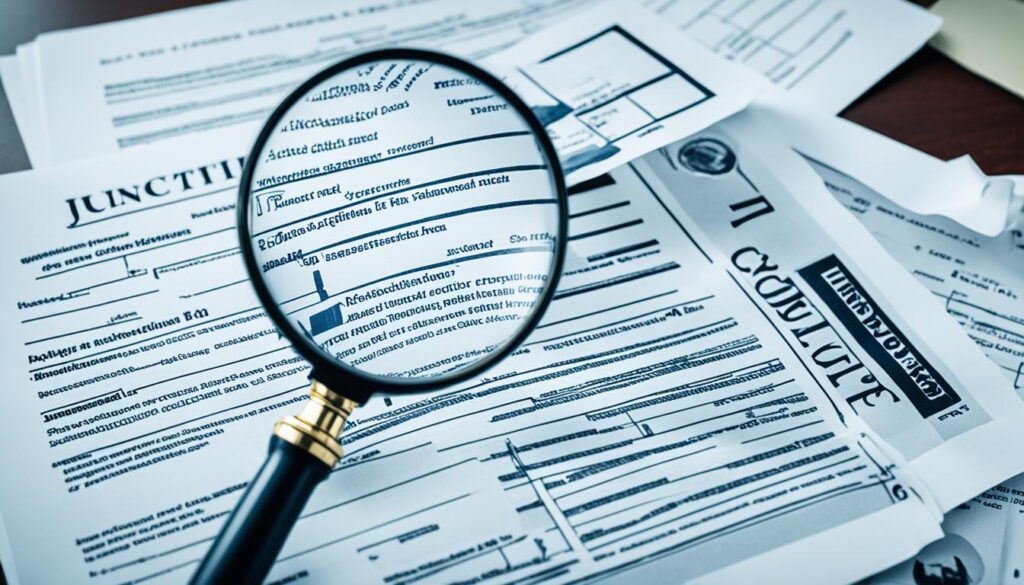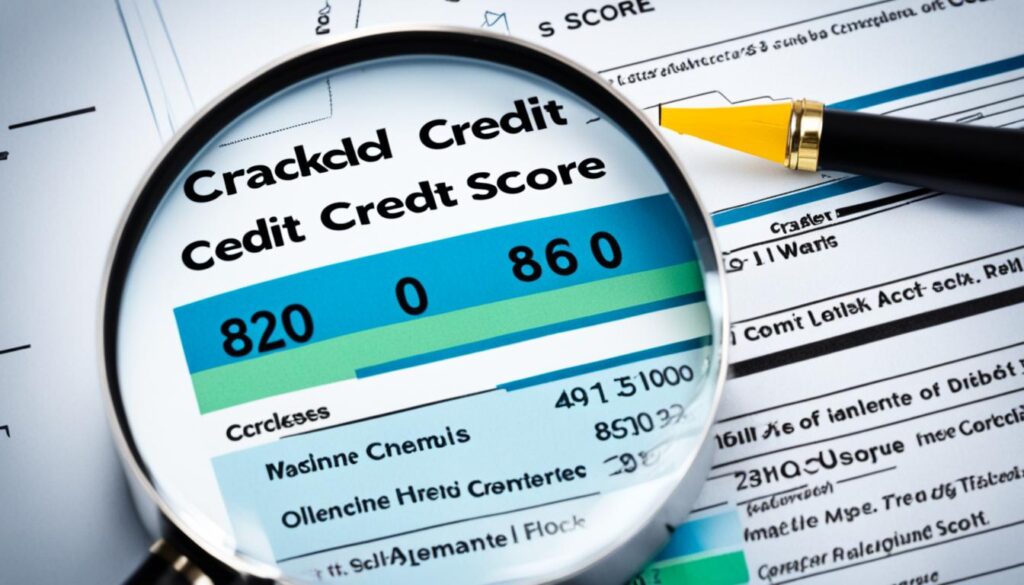Your credit report is vital for your financial life. Lenders, landlords, and employers use it to assess your creditworthiness. What should you do if you find an error?
Should you dispute it? Will disputing affect your credit score? These are important questions to consider.
The credit report dispute process helps maintain accurate credit information. Understanding its pros and cons can guide your financial decisions.
Credit repair goes beyond fixing mistakes. It’s about controlling your financial story. By addressing inaccuracies, you protect your credit score.
You also ensure your financial reputation reflects your responsible habits. This can have a significant impact on your future opportunities.
Key Takeaways
- Disputing credit report errors is a right protected by law
- The process can lead to improved credit scores if errors are removed
- Disputes don’t directly harm your credit score
- Accurate negative information can’t be removed through disputes
- Regular credit monitoring helps catch errors early
- Professional help is available for complex credit repair cases
Understanding Credit Reports and Disputes
Credit reports are vital to your financial life. They show your credit history, which lenders use to assess you. Credit bureaus create these reports by tracking your loans and payments.
What is a credit report?
A credit report details your credit activities. It includes your personal info, credit accounts, and payment history.
The report also shows public records like bankruptcies. It lists recent credit inquiries too.
Common reasons for credit report disputes
Credit reports often have errors. People dispute reports for wrong personal info or accounts they don’t own.
Outdated negative information is another common issue. Identity theft can also lead to disputes.
- Incorrect personal information
- Accounts not belonging to them
- Outdated negative information
- Identity theft issues
The importance of accurate credit information
Accurate credit info is key to financial health. It affects loans, rentals, and even job prospects.
Regular credit checks help spot errors early. This protects your rights and financial future.
| Impact of Inaccurate Information | Benefits of Accurate Reports |
|---|---|
| Lower credit scores | Better loan terms |
| Higher interest rates | Easier approval for credit |
| Denied credit applications | Improved financial opportunities |
“Your credit report is your financial report card. Keep it accurate, and doors will open.”
The Credit Report Dispute Process Explained
Fixing errors on your credit report is vital for financial health. The process involves contacting credit bureaus and providing evidence. Knowing your rights under the Fair Credit Reporting Act is essential.
Start by gathering documents that prove the inaccuracy. These may include bank statements, payment receipts, or creditor correspondence. Then, write a clear letter to credit bureaus explaining the error.
Credit bureaus must investigate disputes within 30 days. They’ll contact the information provider to review your claim. If found incorrect, the provider must notify all credit bureaus to update.
“Your credit report is a reflection of your financial life. Ensuring its accuracy is not just a right, but a responsibility.”
If the dispute changes your report, you get a free updated copy. You can ask the bureau to send correction notices to recent report recipients.
Disputing real errors is important, but false claims hurt your credibility. Always be honest when fixing your credit history.
Does It Hurt to Dispute a Credit Report?
Disputing a credit report is vital for maintaining financial health. Many worry about its impact on credit scores. Let’s examine how disputing errors affects credit repair.
Short-term Effects on Credit Score
Starting a dispute might cause a small, temporary drop in your credit score. This happens while the disputed item is under review. The impact is usually minor and brief.
Long-term Benefits of Dispute Resolution
Successfully resolving disputes can greatly improve your credit score. Removing wrong negative information often boosts your score. This shows why it’s important to keep your credit report accurate.
Potential Risks of Disputing Accurate Information
Challenging correct information on your credit report can backfire. It may look like you’re trying to manipulate your credit history. This could harm your creditworthiness and make future credit repair harder.
| Aspect | Positive Outcome | Negative Outcome |
|---|---|---|
| Credit Score | Improved score after error removal | Temporary dip during dispute process |
| Credit Report Accuracy | Enhanced report reliability | Potential flag for frivolous disputes |
| Future Lending | Better loan terms and approval odds | Skepticism from lenders if disputes are frequent |
Disputing real errors is your right and can help your financial health. Always be honest and have good records when disputing. This ensures the best results for your credit profile.
Pros of Disputing Credit Report Errors
Disputing credit report errors can greatly improve your financial life. It’s a powerful tool for credit repair. Taking action on inaccuracies can lead to significant benefits.

Removing false negative items can boost your credit score. This can open doors to better loan terms. You might save thousands of dollars over time.
Disputes help maintain the integrity of your credit history. Lenders will see an accurate picture of your financial behavior. This is crucial when applying for loans or credit cards.
- Improved credit scores
- Better loan terms
- Enhanced financial opportunities
- Protection of your consumer rights
By disputing errors, you’re taking control of your financial future. Credit bureaus must investigate disputes by law. This gives you a powerful tool to protect your credit.
“Taking action on credit report errors is an investment in your financial health that can pay dividends for years to come.”
The pros of disputing credit report errors are significant. It’s a crucial step in maintaining a healthy credit profile. This ensures access to the best financial products available.
Cons and Potential Drawbacks of Credit Disputes
Disputing credit report errors can be helpful, but it has its challenges. Understanding these issues can guide your credit repair decisions. Let’s explore some potential drawbacks of the dispute process.
Time and Effort Required
Credit disputes demand significant time and effort. You’ll need to gather documents, write letters, and follow up with credit bureaus. This process can be lengthy, especially for multiple or complex disputes.
Possible Temporary Credit Score Fluctuations
Disputing inaccuracies doesn’t directly affect your credit score. However, changes from the dispute can cause temporary score fluctuations. This may concern those planning to apply for credit soon.
Risk of Dispute Rejection
Your dispute could be rejected if information is verified as accurate. This can be frustrating, especially if you believe it’s truly inaccurate. In such cases, you might need to explore other credit repair options or seek professional help.
| Drawback | Impact |
|---|---|
| Time Investment | Weeks to months for resolution |
| Credit Score Impact | Potential short-term fluctuations |
| Dispute Rejection | Item remains on report if verified |
Despite these drawbacks, disputing inaccurate information is crucial for a healthy credit profile. Consider these cons against potential benefits when deciding to initiate a dispute. Your financial situation should guide your choice.
Your Rights Under the Fair Credit Reporting Act
The Fair Credit Reporting Act safeguards your rights regarding credit reports. It sets guidelines for credit bureaus and empowers you over your financial data. This law gives you control over your financial information.

- Get a free copy of your credit report once a year
- Dispute wrong info on your report
- Have outdated negative marks removed
- Know if info in your file has been used against you
- Give permission before employers can check your credit
Credit bureaus must investigate disputes within 30 days. If they can’t prove the info is correct, they must remove it. This helps maintain an accurate credit report.
You can seek damages if a company violates your rights under this law. Knowing these rights is crucial for protecting your financial health.
| Right | What It Means For You |
|---|---|
| Free Annual Credit Report | Check your report for errors once a year at no cost |
| Dispute Errors | Challenge wrong info and have it corrected or removed |
| Limited Access | Control who can view your credit information |
| Negative Info Removal | Most negative items must be removed after 7 years |
Understanding these rights puts you in charge of your credit. Stay alert and act promptly if you notice issues on your report. Your financial future depends on it.
How to Effectively Dispute Credit Report Errors
Fixing credit report errors is vital for a good credit score. The credit report dispute process can be tricky. But with the right steps, you can challenge mistakes and boost your credit.
Gathering Necessary Documentation
First, collect documents that back up your claim. These may include bank statements, payment receipts, and creditor letters. If needed, gather court documents too.
Sort these papers by date. This will help build a strong case for your dispute.
Contacting Credit Bureaus
Contact major credit bureaus to start your dispute. You can do this online, by mail, or phone. Each bureau has its own method:
| Credit Bureau | Online Dispute | Mail Address | Phone Number |
|---|---|---|---|
| Equifax | equifax.com/dispute | P.O. Box 740256, Atlanta, GA 30374 | 866-349-5191 |
| Experian | experian.com/dispute | P.O. Box 9701, Allen, TX 75013 | 888-397-3742 |
| TransUnion | transunion.com/dispute | P.O. Box 2000, Chester, PA 19016 | 800-916-8800 |
Following Up on Dispute Status
After submitting, keep track of your dispute. Credit bureaus usually have 30 days to investigate and respond. Note all communications and set reminders to follow up.
Don’t give up on credit repair. If your first try fails, think about getting expert help. You can also look into other ways to fix your credit report errors.
Impact of Disputes on Credit Scores and Future Lending

Credit disputes can shape your financial future. It’s vital to grasp how challenging inaccuracies affects your credit score and lending chances.
Filing a dispute may cause a brief dip in your credit score. This happens because the disputed item is temporarily excluded from calculations.
Once resolved, the credit score impact can be significant. Removing negative items can boost your score, leading to better loan terms.
Future lenders view resolved disputes favorably. It shows you’re proactive about your credit health. This can benefit you when applying for loans or credit cards.
“A clean credit report is like a financial passport. It opens doors to better financial opportunities.”
The benefits of disputing errors outweigh short-term changes. An accurate credit report sets you up for long-term financial success.
- Short-term: Possible minor score decrease
- Long-term: Potential score increase
- Future lending: Improved chances of approval
Stay alert about your credit report’s accuracy. Regular checks and timely disputes are key to effective credit repair.
Credit Monitoring and Identity Theft Prevention
Monitoring your credit is vital in our digital world. It helps spot suspicious activity and prevent identity theft. By staying informed, you can catch errors early and protect your finances.
Identity theft can happen to anyone. Criminals may use your info to open fake accounts or make purchases. Credit monitoring services offer real-time alerts about new accounts or inquiries.
To protect your rights and financial health, try these steps:
- Review your credit reports regularly
- Set up fraud alerts with credit bureaus
- Use strong, unique passwords for all accounts
- Be cautious about sharing personal information online
Prevention is key to reducing future credit disputes. AI-powered credit repair tools can help streamline the monitoring process. This makes it easier to keep a healthy credit profile.
Stay alert and act quickly if you notice any red flags. Your financial future depends on protecting your identity and credit information.
When to Seek Professional Help for Credit Disputes
Fixing credit issues can be challenging. Sometimes, expert help is the best choice for your credit repair needs. Let’s explore when professional assistance might be necessary.
Credit Repair Services: Pros and Cons
Credit repair companies can save you time. They know the credit report dispute process well. However, they can’t remove accurate negative information.
It’s crucial to compare the cost with potential benefits. Consider this before hiring a service.
Legal Assistance for Complex Disputes
Credit issues can get complicated. You might need a lawyer for identity theft or credit-related lawsuits. They can protect your rights and guide you through tough situations.
DIY vs. Professional Credit Repair
Many credit disputes can be handled on your own. It’s free and helps you understand your finances better. Professional help could be worth it if you’re overwhelmed or short on time.
Be cautious of big promises. No one can guarantee a specific credit score increase.

